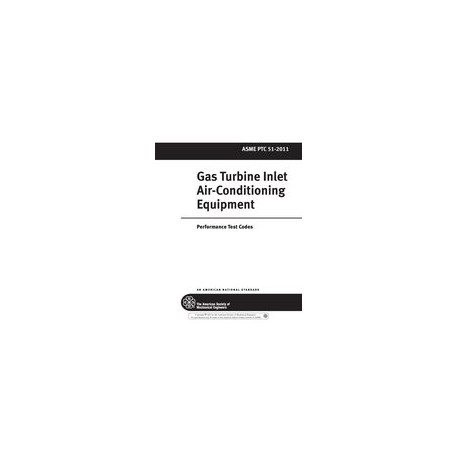Cart
0
Product
Products
(empty)
No products
To be determined
Shipping
$0.00
Total
Product successfully added to your shopping cart
Quantity
Total
There are 0 items in your cart.
There is 1 item in your cart.
Total products
Total shipping
To be determined
Total
 View larger
View larger
ASME PTC 5 -2011
M00000610
New product
ASME PTC 5 -2011 Gas Turbine Inlet Air-Conditioning Equipment
standard by ASME International, 02/29/2012
In stock
More info
Full Description
This Code provides procedures for in-situ testing of inlet air conditioning systems (cooling/heating) as they apply to gas turbines in simple, cogeneration, and combined-cycle applications. Specifically, the procedures may be used to determine the following performance variables, as applicable:Performance Factor Carryover Auxiliary consumption (power/thermal) Temperature change Water discharge Water consumption Distribution/stratification Pressure drop This Code provides procedures for the calculation of the results, and for the correction of the results to reference conditions as a measure of gas turbine inlet air-conditioning systems performance.
Cooling systems covered by this Code include evaporative systems (foggers and media-based evaporative coolers) and mechanical/thermal refrigeration systems. Heating systems covered by this code include compressor-bleed type systems and heating-coils systems.
This Code contains rules and procedures for conducting and reporting tests of gas turbine inlet air-conditioning systems, including requirements for pretest arrangements, testing techniques, instrumentation, methods of measurement, and methods for calculating test results and uncertainty.
In planning and conducting the test, both a pre-test and post-test uncertainty analyses are required to accomplish testing with reasonable accuracy and in recognition of the fact that there is a diverse range of inlet conditioning system designs covered by this Code. Each unique system has corresponding uncertainty levels that are dependent on the system type, specific design complexity, and consistency of operation during a test, and cannot be generally categorized for purposes of establishing uncertainty limits on the test results achievable from testing in accordance with this Code. Uncertainty values for some typical systems are derived using the limiting uncertainties of all measurement parameters and variables.

